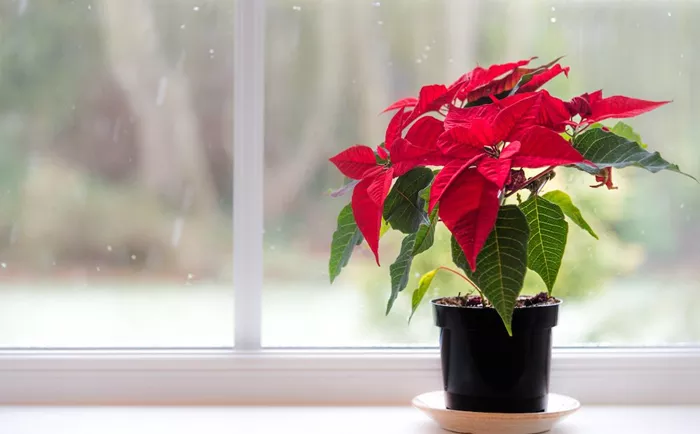As the holiday season approaches, many of us are drawn to the vibrant beauty of poinsettia plants. These festive flowers not only add a splash of color to our homes but also evoke feelings of warmth and joy. However, for pet owners, particularly those with dogs, concerns about the safety of these plants can arise. This guide aims to clarify the nature of poinsettias, their potential toxicity to dogs, and what to do if your furry friend encounters one.
What are Poinsettia Plants?
Poinsettias (Euphorbia pulcherrima) are popular ornamental plants known for their striking red and green foliage. Native to Mexico, they have become a staple in holiday decorations across the globe. The plant’s colorful bracts (modified leaves) are often mistaken for flowers, contributing to its appeal during festive seasons. Poinsettias thrive in warm environments and require minimal care, making them a favorite among gardeners and decorators alike.
Are Poinsettia Plants Poisonous To Dogs?
The short answer is that poinsettias are mildly toxic to dogs. While they do contain a milky white sap that can irritate the mouth and stomach when ingested, the effects are generally not severe. Most dogs will experience only mild symptoms such as drooling or slight gastrointestinal upset if they nibble on a poinsettia leaf. It is crucial for pet owners to remain informed about the potential risks associated with this plant while also understanding that serious health issues are rare.
Causes of Poinsettia Plants Poisoning To Dogs
Poinsettia poisoning occurs primarily due to the ingestion of the plant’s leaves or bracts. The milky sap contains compounds such as diterpenoid euphorbol esters and saponin-like detergents, which can cause irritation in pets. While most dogs may be curious about new plants in their environment, it’s essential to recognize that not all parts of the poinsettia are equally harmful. Ingestion of large quantities may lead to more noticeable symptoms, but small amounts typically result in mild discomfort.
Symptoms of Poinsettia Plants Poisoning To Dogs
If a dog ingests part of a poinsettia plant, pet owners should watch for specific symptoms that may indicate mild toxicity:
Drooling: Excessive salivation may occur as a response to irritation.
Vomiting: This is relatively rare but can happen if a dog has consumed a significant amount.
Diarrhea: Also uncommon but possible if large quantities are ingested.
Skin Irritation: If the sap comes into contact with the skin, it can cause redness and itching.
Eye Irritation: Contact with sap may lead to mild discomfort or tearing.
Most symptoms are self-limiting and will resolve without medical intervention.
Treatments for Poinsettia Plants Poisoning To Dogs
In most cases, treatment for poinsettia poisoning is straightforward and can often be managed at home:
Remove Access: Immediately take away any remaining parts of the plant from your dog’s reach.
Rinse Mouth: If safe to do so, rinse your dog’s mouth with water to remove any residual plant material.
Monitor Symptoms: Keep an eye on your dog for any signs of distress or discomfort over the next few hours.
Contact a Veterinarian: If your dog exhibits severe symptoms or if you have concerns about their health, consult your veterinarian or contact an emergency animal hospital.
Recovery from Poinsettia Plants Poisoning To Dogs
Most dogs recover quickly from mild poinsettia poisoning with little to no medical intervention required. Providing fresh water and monitoring their behavior will help ensure they remain comfortable during recovery. If vomiting or diarrhea persists beyond 24 hours or if you notice blood in their vomit or stool, seek veterinary care immediately.
Conclusion
Poinsettias can be a delightful addition to holiday decorations; however, it is essential for pet owners to understand their potential risks. While these plants are only mildly toxic to dogs, awareness and caution can help prevent any unpleasant incidents. By keeping poinsettias out of reach and observing your pets’ behavior around them, you can enjoy the beauty of these festive flowers without worry.
3 Frequently Asked Questions Answered
Are all parts of the poinsettia plant toxic?
While all parts contain some level of irritants, ingestion in small amounts typically leads to mild symptoms rather than severe toxicity.
What should I do if my dog eats a poinsettia?
Remove the plant immediately, rinse your dog’s mouth if possible, monitor for symptoms, and consult your veterinarian if necessary.
Can other holiday plants be toxic to dogs?
Yes, several common holiday plants like mistletoe and holly can be more toxic than poinsettias; always research any new plants introduced into your home environment.
With this knowledge in hand, gardening enthusiasts can enjoy their poinsettias while ensuring their furry companions remain safe during the holiday season!


